- Home
- Jana Oliver
Madman's Dance (Time Rovers) Page 16
Madman's Dance (Time Rovers) Read online
Page 16
Why should my fate be any different?
“Are you prepared if they call you as a witness?” Reuben asked, keeping his voice low.
“Yes, I am,” Alastair replied resolutely.
Lord Wescomb leaned closer, clad in his black robe and horsehair wig. “They will try to ignore the scientific evidence. Most likely they will go after you as Keats’ friend. Perhaps even mention your past brush with the law.”
Alastair gave him a sharp look. “My past has no bearing on—”
“Come now, Alastair, don’t be naïve!” Wescomb replied. “The Crown Prosecutor is particularly known to go for the jugular. If he can plant a seed of doubt that you tampered with the evidence, that you’re not a man of your word, all the rest will mean nothing.”
“So what do you propose?” Alastair asked, acidly.
“I will stress that neither of you knew that Keats was the prime suspect when the chief inspector summoned you to the scene of the crime, and that you did your duty without bias.”
“Does the chief inspector know this?”
“Yes. He agreed to it.”
Reuben shook his head. “Fisher is destroying his career.”
“Perhaps, but at this point we’re only worried about Sergeant Keats.”
“I will do my best,” Alastair pledged, still frowning.
“Whatever you do, refer to Mr. Justice Hawkins as my lord. It’s a term of respect. The justices are rather prickly about that.”
“I shall.”
“And do rein in that temper of yours. Now is not the time for emotional displays.”
Chastised, Alastair murmured, “Yes, my lord.”
“Be upstanding in Court!” a strident voice cried out. The courtroom rose as Justice Hawkins entered. With a rustle of his red and black silk gown, he settled into his chair. The room returned to their seats.
Keats braced himself for what would come next.
The Clerk of the Court cleared his throat and read out the charges.
“Jonathon Davis Keats, you are indicted and also charged with willful murder of Nicola Therese Hallcox on the 13th day of October instant. Are you guilty or not guilty?”
Keats rose with a clatter of the chains. He ensured his voice was firm and penetrated to all parts of the room. “Not guilty, my lord.”
There were boos, but a few cheers came from the spectator’s gallery, requiring Judge Hawkins to voice his disapproval. That surprised Keats. He’d figured everyone was keen to see him hang. Confounded, he lowered himself into the chair.
He made a study of the men who would hold his life in the balance. The jury was a mixed lot, both young and old. Only a few of them were staring up at him, the rest at the Crown Prosecutor, who cut a striking figure in his black robe and wig.
“You may proceed, Mr. Arnett,” the judge commanded.
Arnett rose. “May it please you, my lord, members of the jury, I appear in this case with my learned assistant, Mr. Daniel Pryor, for the Prosecution. The Defence of Sergeant Jonathon Keats will be conducted by my learned colleagues Lord Sagamor Wescomb and Mr. Herron Kingsbury.”
“Just so,” the judge replied, nodding his approval.
To Keats’ relief, Wilfred Arnett was not as long-winded as most. As Arnett laid the case before the jurors, the summary leaned heavily on Keats’ moral downfall, which led the prisoner to strangle Nicci Hallcox after what the prosecutor supposed was a night of unrestrained sexual congress.
The image made Keats queasy. He had never found Nicci of interest in that way. If anything, he’d always had the strong desire to boil his skin after coming in contact with her.
Arnett paused dramatically for emphasis. “We shall see that one of the motives for this horrendous crime lies within the victim herself.”
Syphilis. Wescomb had said he’d hoped Arnett would go that way rather than toward blackmail. Keats wasn’t sure if it would make any difference. From what he’d heard from his lordship, Home Office was applying pressure, insisting that certain topics were off limits during the trial. Wescomb had promised to work around those limitations as much as possible, but the blunt truth was that his barrister was already hobbled.
Much of the Crown’s case hinged on the butler’s testimony. Wescomb, in particular, was hoping to tear that to shreds during cross-examination. In the end, it might come down to the world learning about the existence of the Transitives or one detective-sergeant going to the gallows to preserve that secret.
That’s no consolation.
Keats struggled to catalog every detail as Arnett continued, but his mind easily wandered. Who had been the killer? Was he in this very room, watching while gloating over his fortunate escape?
The first witness was called forward to the witness box. After the inspector held the Bible and swore the oath, Arnett began to build his case.
“Inspector Hulme, you are local inspector in “C” Division, are you not?”
“Yes, sir.”
“Tell us your actions on the night of the crime.”
“I was called to the Hallcox residence at Half Moon Street at approximately one in the morning on the fourteenth of October this year.”
“What did you discover at that address, Inspector?”
“The deceased, Nicola Hallcox, lying on her bed.”
“Who found the body?”
“Her lady’s maid, Miss Ellis.”
“At what time was the body discovered?”
“Approximately half past midnight.”
“And the manner of death?”
“According to the post-mortem, Miss Hallcox was strangled with the cord from her dressing gown,” Hulme replied.
“Was there anything else about the scene that you found unique?”
Keats set his jaw. He’d already heard the details from Wescomb. To look away might indicate to the jury that he was responsible for such a horror.
“She was…unclothed and her hands were placed on her breasts. Her legs were parted and—” Hulme halted abruptly, took a deep breath and then continued, “and a fireplace poker was lying on the bed, pointing toward her female regions.”
There were gasps throughout the courtroom.
“What does it indicate to you, Inspector?”
“An extremely disturbed mind.”
“Sexual deviancy, perhaps?” Arnett asked.
Wescomb rose. “Your lordship,” he protested, “my learned colleague is leading the witness.”
The judge nodded sagely. “Indeed you are, Mr. Arnett.”
“As your lordship pleases,” the prosecutor conceded.
“With due respect, your lordship,” Wescomb continued, “unless Inspector Hulme is an expert in deviant sexual behavior, his opinion is hardly worthy of speculation.”
“Certainly it could be argued that a police officer has daily contact with just such behavior,” Arnett retorted.
“He well may come in contact with it,” Justice Hawkins replied, “but that does not make him an expert. I am in the company of criminals every day, however I certainly wouldn’t be inclined to consider myself an expert safecracker or forger.” Justice Hawkins peered down at Hulme. “Confine yourself to the facts, Inspector.”
“Yes, my lord,” Hulme replied with a deferential nod.
Arnett smoothly transitioned to the next question. “Was there any sign of a struggle or disarray in the room?”
“None.”
“What did that indicate to you?”
“That the victim knew her killer, and that he overpowered her before she could cry out.”
“At what point did you summon Chief Inspector Fisher from Scotland Yard?”
“After I found the prisoner’s calling card tucked underneath the deceased’s jewelry box. I then spoke with the butler. He admitted that the prisoner had been the last to see his mistress alive.”
Wescomb rose. “My lord, that is conjecture on the butler’s part.”
“The jury should make note of that fact.” The judge gestured to the prose
cutor. “Proceed, Mr. Arnett.”
“Why did you feel the need to summon Chief Inspector Fisher? Have you not handled murder investigations in the past?”
“I have, sir,” Hulme replied brusquely. “I thought it proper that the chief inspector be made aware that one of his sergeants might be involved in this matter.”
“What did you do while you awaited his arrival?”
“I sent for the coroner, continued my inspection of the murder scene, and spoke with the witnesses.”
“Ah, yes, the coroner. We’ll get back to that. What did the butler,” Arnett consulted a paper, “what did Mr. Landis tell you about the prisoner’s numerous visits prior to Miss Hallcox’s death?”
Wescomb shifted positions, indicating his displeasure.
Hulme flipped a page in his notebook. “Mr. Landis stated that the prisoner arrived at the house on the evening before the crime and then twice on the night Miss Hallcox was murdered. On that particular evening, the first visit was at quarter past eight. During that time, the prisoner had a verbal confrontation with the mistress of the house and left ‘in a fine fury,’ as Mr. Landis put it. The prisoner then returned at approximately quarter of eleven. He did not make his presence known, but ascended the stairs directly to Miss Hallcox’s bedroom.”
“When did the butler say he left?”
“Sometime before half past twelve, when the lady’s maid went to check on her mistress.”
“He did not see the prisoner depart?”
“Initially, he said he did. During later questioning he admitted he was otherwise engaged.”
“Did you visit the prisoner’s rooms?”
“Yes.”
“Did you find anything of value there?”
“I found a set of lock picks.”
“Are those standard issue for a detective-sergeant?” Arnett quizzed.
“Not that I am aware.”
Keats perked up. The lock picks were a gift from the night he’d caught Fast Eddy Klein removing a king’s ransom in diamonds from a Hebrew jeweler in Whitechapel. The criminal had promised to retire if Keats would let him go. Keats hadn’t, but after Eddy finished his sentence, he’d delivered a new set of lock picks as a memento of his last caper, and even shown Keats how to use them. Last he’d heard Eddy was in Paris, living a gentleman’s life of leisure.
While I’m in the dock.
Realizing he’d been woolgathering, he pulled himself back to the present. Arnett had seated himself. Wescomb rose, adjusting his embroidered waistcoat. Keats felt his breath catch.
“Inspector Hulme, during your investigation did you discover anyone else besides the butler who witnessed the prisoner’s arrival or departure from Miss Hallcox’s home on the night of the murder?”
“No.”
“Really? No jarvey or someone on the street, a neighbor perhaps?”
“None.”
“Not even another member of the domestic staff?” Wescomb pressed, raising his voice in surprise.
“No.”
“How remarkable. You would have thought someone would have seen the sergeant, admitted him to the house.”
“None of the servants claim they did.”
“I see. At any time did Chief Inspector Fisher interfere with your investigation?”
“Only in the matter of the coroner. He insisted I summon Dr. Bishop to conduct the post-mortem.”
“Did he state his reasons?”
“No, he did not.”
“Other than a preference for Dr. Bishop, was there any other interference?”
“No.”
“What did Chief Inspector Fisher do when he realized that his sergeant might be involved in this case?”
“He immediately sent a constable to the prisoner’s rooms, but the prisoner wasn’t there.”
“What were you doing while you were awaiting that report?”
“The chief inspector insisted we interview the butler and the other servants, yet again.”
“What did you learn during this second interview?”
“It was at this time that Mr. Landis admitted that he had not seen the prisoner leave the house.”
“Did you smell liquor on Mr. Landis’ breath?”
“Yes. Quite a lot of it, actually.”
Arnett rose. “My lord, certainly it could be argued that he sought the comfort of a stiff one to steady his nerves, given the brutal murder of his mistress.”
“So it may be,” Wescomb conceded graciously. He turned his attention back to the inspector. “I understand a collection of calling cards were found at the scene.”
Hulme’s face went ashen.
“My lord,” Arnett began, issuing Justice Hawkins a concerned look.
“I shall confine my questions to the nature of the cards, not their owners, your lordship,” Wescomb replied.
The justice eyed him. “Ensure that you do so.”
Wescomb returned his attention to the inspector. “The calling cards. Who discovered those?”
“Dr. Reuben Bishop.”
“Where were they found?”
Hulme looked uncomfortable. “They had been hidden in a false bottom of the deceased’s jewelry case. I…did not think to look there.”
“Didn’t you have the maid verify if any of her mistress’ jewelry had gone astray?”
There was a lengthy hesitation. “Ah, no.”
“Why not?” Wescomb challenged. “Certainly you would wish to ascertain if the murder may have been committed during the course of a robbery?”
“I did not think a member of Scotland Yard would resort to petty thievery.”
“And yet he may resort to murder?”
Hulme’s jaw tightened.
Well played!
“Why do you think Miss Hallcox concealed the calling cards? Most of us are proud to display such items if they involved important personages. We even place them in plain view on our mantels so others may see who have visited us.”
“Tread carefully, Lord Wescomb,” Hawkins warned.
“I shall, my lord.”
Hulme ran a finger under his collar. “The lady’s maid said Miss Hallcox collected them from her…admirers,” he replied, directing a worried look to the judge.
Wescomb flipped a page of notes. “Your report states there was a stack of cards. Just how many comprise a stack, Inspector?”
“In this case, forty-six.”
Wescomb appeared shocked, though Keats knew his lordship was already aware of the number. “All men?” Another nod. “It would appear that the deceased was a very social lady, wouldn’t you say?” There were titters in the crowd.
“I guess so.”
“Perhaps any one of those men may have had reason to end her life. Did you interview any of these forty-six potential suspects?”
“No.”
“Why not?”
“The butler said he saw the prisoner go up to his mistress’ room. I thought it a waste of effort to interview those who had not been present in the house at the time of the murder.”
“So you based that decision on the butler’s testimony, testimony that changed in the course of two interrogations?” Wescomb asked.
“Yes.”
Wescomb shifted to another paper. “Your report indicates that dates were inscribed on the back of these cards. What do you think those were about?”
“The maid said her mistress made note of when a gent came calling,” Hulme replied.
“I see. Did some of the cards have more than one date?”
“Yes, some did.”
“You state that you found Sergeant Keats’ calling card, but not concealed like the others.” Hulme nodded. “Were there any notations on his card?” his lordship quizzed.
“No. I don’t think she had time to make the note.”
“Or is it possible that his visit was of a different nature than her other callers?”
“Might have been,” the inspector allowed.
“What steps did you take to verify Sergeant
Keats’ alibi?”
“I went to Whitechapel and interviewed some of the locals. I found a woman who had seen him earlier in the evening, before the murder. Crickland was her name.”
“What else did you do?”
“I went to find someone who had seen the prisoner or spoken with him in Ingatestone, where he claimed to be on the seventeenth of this month.”
“Did you have any luck?”
“No.”
“No one at all?”
“No,” Hulme repeated, his eyes downcast.
You’re lying.
“What about the sergeant’s boots?” his lordship pressed. “According to his statement, he pawned them in Ingatestone to gain money to return to London.”
“I talked to the pawnbroker. He said he never saw the prisoner.” Hulme was still avoiding Wescomb’s gaze.
“Did you talk to any of the other pawnbrokers?”
“I was told there weren’t any. Ingatestone isn’t a big town, like London.”
“Yet, just yesterday Inspector Ramsey did find the sergeant’s boots at the exact shop where he said he pawned them.”
“Yes,” Hulme mumbled.
“While in Ingatestone, did you go into the woods to try to locate the coffin in which Sergeant Keats was spirited away from London?”
“No. It’s very dense in that area. It would be a worthless hunt.”
“As a man’s life is on the line, I would argue it would be a hunt worth pursuing,” Wescomb chastised. “Did you at least attempt to verify if any coffins had gone missing the night of Miss Hallcox’s murder?”
“None had.”
“You spoke with the all coffin makers in Whitechapel?”
Hulme’s face tightened. “Most of them.”
“But not all?”
“No.”
“That will be all, Inspector.”
Keats let out a measured sigh. That had been brilliant. Wescomb had proved Hulme wasn’t as thorough as one would expect. Though in principle he disliked such a tactic, undermining the jury’s belief in the competence of the investigating officer was vital in this case.
Arnett rose. “I would like to ask a few follow-up questions, your lordship.”

 Mind Games
Mind Games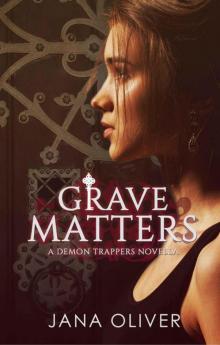 Grave Matters
Grave Matters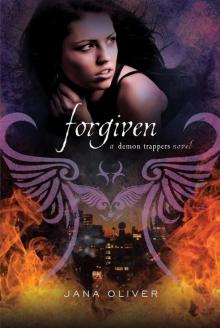 The Demon Trappers 3: Forgiven
The Demon Trappers 3: Forgiven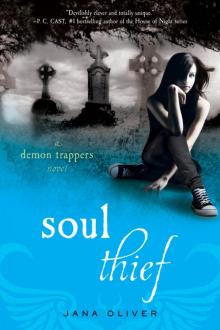 Forbidden
Forbidden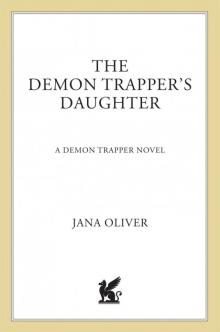 Forsaken
Forsaken Briar Rose
Briar Rose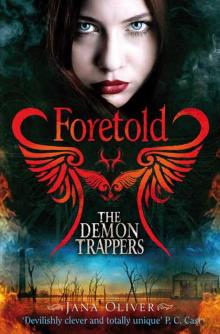 The Demon Trappers: Foretold
The Demon Trappers: Foretold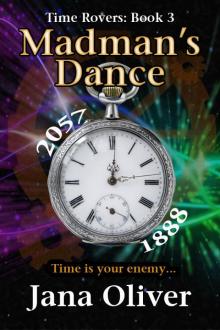 Madman's Dance (Time Rovers)
Madman's Dance (Time Rovers)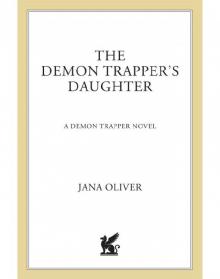 The Demon Trapper’s Daughter
The Demon Trapper’s Daughter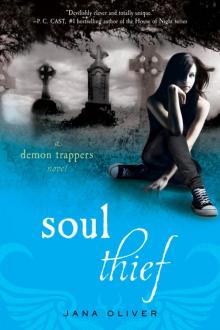 Soul Thief-Demon Trappers 2
Soul Thief-Demon Trappers 2 Mind Games (Demon Trappers Book 5)
Mind Games (Demon Trappers Book 5)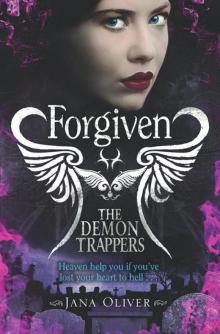 The Demon Trappers: Forgiven
The Demon Trappers: Forgiven